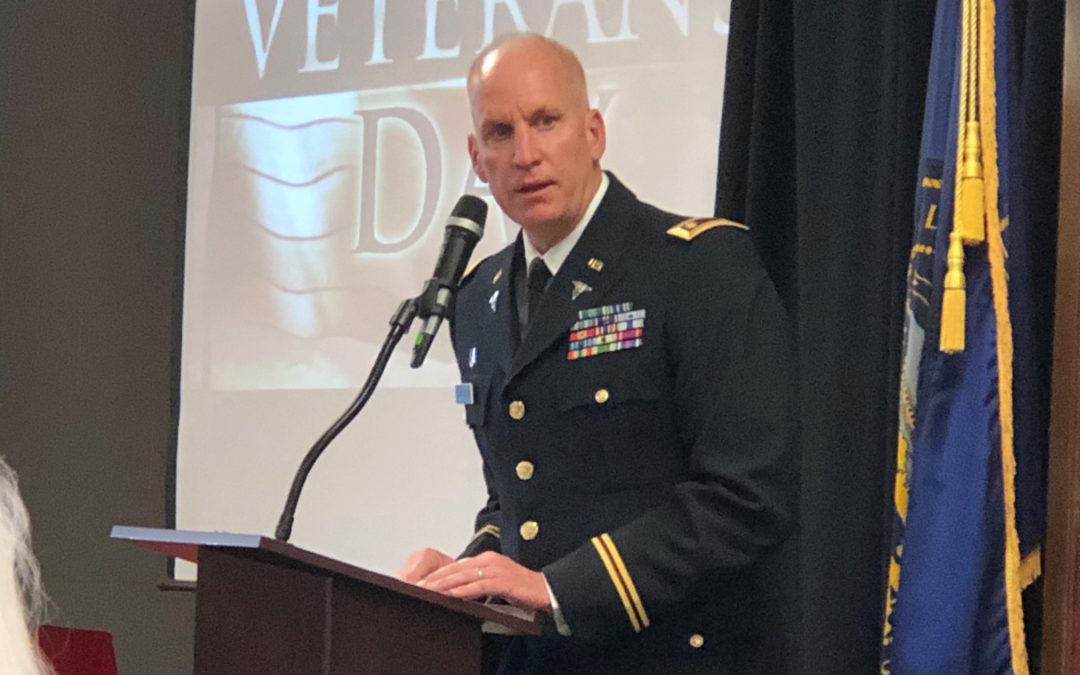


Caring for Our Heroes: How Community Care Helps Veterans
Gateway Vista, a Nye Health Services campus, is now a participating facility under the Veterans Affairs Community Care Network (VA CCN) for all eligible Veterans who could benefit from short term rehabilitation services and outpatient therapy services. Both Optum and United Healthcare are collaborating to manage the VA CCN, a national VA initiative.
Gateway Vista’s Executive Director is a 25 year Active Duty and Reserve Officer and has worked in healthcare for over 20 years. Executive Director (Major) Mark Sroczynski knows what it means to serve. Mark states that, “As a 25 year Active and Reserve Duty Officer, I know what it means and how to relate to Veterans, especially during the healing process. One of several duties I was fortunate to complete, was a 12 month tour at Brook Army Medical Center, San Antonio. There I Commanded the first Warrior Transition Unit and averaged approximately 200 Soldiers, Airman, Navy and Marines who were there to recover from their injuries.”
“The VA Community Care Network allows Veterans who qualify to come to our organization outside of the VA to provide services. All people, including Veterans, should have this choice as to where they want their care to take place. Join us.”
Veterans Affairs provides healthcare for Veterans in your local community. If Veterans Affairs cannot provide the care needed, then the Veteran may be eligible to receive care from a community provider. This is provided on behalf of, and paid for, by Veterans Affairs. Before a Veteran can receive community care from a provider, the VA must first authorize the care. Gateway Vista, one of Nye Health Service’s campuses, is proud to service our nation’s veterans.
Types of Care Available
Veterans Affairs ensures that even after a soldier’s service has ended, the person behind the uniform has the care needed for their entire life. Veterans may be eligible for the following types of care:
- General Community Care: If you require a specialty service or health care need that is not offered at a VA medical facility, then you may qualify for general community care. For example, maternity care is not offered at VA medical facilities, so a patient could be eligible for general community care. General community care needs to be pre-authorized by Veterans Affairs.
- Emergency Care: If you’re suffering from a life threatening emergency, call 911 first and go to the nearest emergency room. For emergency care, a prior VA authorization is not necessary, as your immediate health and well-being is a priority. A claim for emergency care will never be denied based solely on VA not receiving notification prior to seeking care.However, you should contact the VA within 72 hours of admittance to help VA staff coordinate discharge or follow-up medical care.
- Home Health Services and Hospice Care: The VA aims to keep chronically ill or disabled Veterans in their homes as long as possible. Skilled home health care, palliative care, homemaker services, and hospice care are all considered extended care services under the direction of a VA physician.
- State Veterans Homes: A VA social worker can provide you with additional details about State Veterans Homes. These facilities provide services such as adult day care or nursing home services.
Veterans Affairs provides a wide variety of care options for Veterans throughout their lives.
Cost and Billing Options for Veterans
The VA provides several different billing options for Veterans such as paying online through a secure server, by phone, in person at a VA medical facility, or by mail. Veterans are charged a co-payment for care provided directly by VA,or through a community provider outside of VA. The co-payment amount is based on the type of health care service you receive and your financial situation. For Veterans struggling with co-payments due to loss of job, or a sudden decrease in income, contact the VA to see if you qualify for financial hardship assistance.
Join Mark and other Veterans to see how Gateway Vista provides state-of-the-art rehabilitation services and top-notch care for its senior residents. Contact us to learn how our impeccable senior living campuses maintain the pride fostered by our nation’s Veterans.
Nye Health Services Award-Winning Campuses & Services
Nye Health Services · 750 East 32nd Street · Fremont, Nebraska 68025 · 402.753.1400 · Privacy Policy | XML Sitemap


The Heartbeat of Seniors’ Lives: How Assisted Living Keeps Seniors Active
Did you know that heart disease is currently the leading cause of death among men and women in the United States? A variety of factors including genetics, lifestyle, diet, and stress levels contribute to this, but a surprising trend is happening for senior citizens. The number of seniors dying from heart disease has actually decreased. What are some reasons for this change, and how are seniors defying nationwide trends related to heart disease? Assisted living and long-term care campuses are a large part of this encouraging statistic, with specialized campuses not only improving seniors’ social lives, but their heart health as well.
Heart Disease in the United States
According to the National Center for Health Statistics, heart disease is the #1 cause of mortality for adults in the United States. Approximately 12% of the population is diagnosed with heart disease, which accounts for almost 7% of all doctors office visits, and 6% of all emergency room visits. Along with clogged arteries, heart disease also clogs doctors’ waiting rooms.
Assisted living campuses are becoming more popular with seniors in the United States as older Americans look for support and community-based housing options. There are many reasons why seniors choose an assisted living campus as the next step for their living arrangement. People looking for help taking medications, bathing, and dressing find that an assisted living campus provides the level of care they need. A bonus? There’s a host of other (heart healthy!) benefits that might not be evident at first.
How a Community Contributes to a Heart-Healthy Future
A heart-healthy lifestyle is one of the factors that can lead to a decrease in developing heart disease. Assisted living campuses are structured to provide safe, secure, and communal living, which in turn lends itself to a happy, healthy heart! The following are guidelines used by many assisted living campuses, which are also beneficial heart health tips for all seniors:
1. Get a Good Night’s Sleep
A regular night’s sleep not only lets your mind rest and re-charge for the following day, it does the same for your heart. Getting good quality sleep lowers your risk for cardiovascular disease, as this is the body’s time to naturally lower heart rate and blood pressure. At assisted living campuses, bedtimes and morning wake-ups are at the same time every day, ensuring a consistent sleep routine. Additionally, the safe campus allows peace of mind at nighttime, knowing that all residents are carefully secured by staff members.
2. Community Fitness is Critical
A body that’s in motion likes to stay in motion! Fitness is important at every age, but especially critical for seniors. Staying active is one of the components of heart health, and at assisted living campuses, fitness is a community affair! Ability-appropriate exercises are completed in group settings that encourage all residents to join the fitness fun. We all know how hard it is to find the motivation to hit the gym alone, but knowing that your peers are doing the same activities is a great incentive to get moving.
3. Social Supports Form Strong Bonds
A recent article from Time Magazine suggests that 1 in 3 seniors identifies as lonely, which affects not only mental health, but also heart health. Depression and loneliness cause increased anxiety, which adds stress on the heart. One of the most critical benefits of assisted living is that it provides a natural community of people who are all at the same stage of their lives, and share many common experiences and interests. With all of the different activities offered, group exercises, and shared dining experiences, seniors have many opportunities to make strong connections with others on a daily basis.
4. Heart-Healthy Dining
If you live on your own, it’s easy to grab a quick, unhealthy snack to stave off hunger pains. At an assisted living campus, every meal is planned around providing well-rounded, heart-healthy meals that are not only delicious, but also highly nutritious.
Holding off heart disease as we age is manageable as long as there are the proper structures in place to boost cardiovascular health. If you’re interested in discussing the various programs and care options provided at assisted living campuses, contact the professionals at Nye Health Services to see how we can keep your heart, and your soul, healthy in your golden years.
Nye Health Services Award-Winning Campuses & Services
Nye Health Services · 750 East 32nd Street · Fremont, Nebraska 68025 · 402.753.1400 · Privacy Policy | XML Sitemap


Seniors, Smiles, and Seasonal Fun: How to Create Holiday Memories with Your Entire Family
The holiday season is just around the corner, meaning that everything takes on an additional sparkle– twinkling lights adorn houses, glittery bows top carefully-wrapped gifts, and party outfits are designed to dazzle. However, the holiday season may not hold the same “shine” it used to for seniors. This time of year, focused on family, friends, and traditions, also comes with reminders of what is no longer present in their lives. Many seniors’ living situations, friend groups, and close family may not resemble the holiday seasons of long ago, which can lead to a feeling of loneliness. This magical time of year is the perfect chance for families to rekindle their bond and include the seniors in their lives with fun and festive activities. Here are some joyful senior-friendly holiday activities that will put the sparkle back into the holiday season for seniors and aging loved ones.
1. Watch Holiday Movie Favorites
Grab a cozy set of blankets, a fresh batch of buttery popcorn, and gather around the television for an evening (or afternoon) of holiday movies. For younger family members, it’s a perfect chance to introduce holiday classics such as “It’s a Wonderful Life” and “A Christmas Story”, or pick from a newer movie such as “Polar Express” or “Hitched for the Holidays.” If you can’t seem to find flicks like Bill Murray’s darkly hilarious “Scrooged” or the iconic “Nutcracker” ballet, scan the channels to find a sappy TV channel devoted to holiday-themed movies.
2. Wrap Presents Together
Colorful patterns, ribbons, bows, and bags are the perfect holiday-themed craft that’s also useful to get that mountain of presents wrapped! Have seniors pick out the wrapping paper and decorations that they like best for each recipient and then get the scissors and tape ready. This is an activity that can be easily modified depending on the person’s abilities. One personal touch is to buy a toy for a child in need, and have your senior write their name as the gift giver. No matter your age, giving back to those in need makes you feel golden.
3. Play Cards or Board Games
Spending time together playing cards or board games keeps everyone’s minds active, and naturally promotes conversation for those with language or articulation difficulties. Games such as Boggle or Scrabble are excellent for helping word recognition and retention, which can also improve daily vocabulary skills.
4. Ready, Set, Bake!
Baking holiday cookies, cakes, and treats was likely a part of a holiday ritual that might be long forgotten, or at least pushed to the side as one ages. Ask your senior about a recipe that they remember baking, and see if they still have the directions in a file folder or cookbook. Get your ingredients, and your family, together and bake some sweet treats! An unexpected bonus is finding a recipe written in the person’s handwriting, or even in another relative’s script. Family recipes that are passed down from one generation to the next are some of the best gifts we can receive.
5. Play Holiday Music and Sing Carols
Fa la la la la! No matter the quality of your singing voice, crooning familiar holiday songs unlocks parts of your loved one’s memory that they may not have thought about for years. Remember being a kid and singing “Jingle Bells”, “Silent Night”, and Rudolph the Red Nosed Reindeer”? Chances are your older family members do as well, and can probably tell you some great stories from their youth about them.
6. Tell Family Stories
Once you’ve opened the door by remembering holiday songs, continue to ask about family stories from past holiday gatherings. You’ll never know about the year that the holiday was almost ruined by burning the turkey, knocking over the tree, or the dog tearing into the presents if you don’t ask! Family stories only stay alive if we continue to tell and talk about them.
7. Go on a Holiday Light Tour
Pour some hot chocolate in a to-go mug and pack up the whole family on a town-wide tour of holiday lights. Some towns offer drive-thru displays or light festivals where you can follow a slow path that takes you past a variety of bright holiday decorations. Not only does this keep everyone warm, this is an excellent option for seniors with mobility issues to still participate in holiday fun.
At Nye Health Services, we recognize the changing needs of seniors and strive to provide a wide array of services, including home care. If you’re considering home care services for a loved one, contact Nye Health Services to see how our compassionate and caring team can help with daily living tasks. Meaningful activities with senior family members are about keeping holiday traditions alive while also recognizing that this is a new, and sometimes scary, time in their lives. See how Nye Health Services assists with these transitional times, so you can focus on spending quality holiday time with your elders.
Nye Health Services Award-Winning Campuses & Services
Nye Health Services · 750 East 32nd Street · Fremont, Nebraska 68025 · 402.753.1400 · Privacy Policy | XML Sitemap


Caring for Your Aging Parents While Supporting Your Children – 5 Tips for the “Sandwich Generation”
Are you taking care of your aging parents and your growing children at the same time? You are the ham, turkey, or even the cheese that’s in the middle of what’s known as sandwich generation. It’s not always an easy place to be. Everyone needs your attention — sometimes at the same time — and you can easily burn out if you’re not careful.
Here are five tips to help you make this time in your life a little easier:
Plan ahead
Your parents didn’t just age overnight and if they aren’t at the point where they will need you as their caretaker, they might soon. Start thinking about what you need to know to make the transition easier for all of you. Do you know what your parents’ wishes are for when they need help? Do you have a good understanding of their medical conditions? Do you know where all of their financial records are and where they want to live?
If you have siblings, who will help and what will they do? Planning as much as you can ahead of time will help prevent undue conflicts and stress when the time comes.
Talk it out
You might have had the important conversation with your parents and siblings, but what about talking to your boss? Something might come up with your parents or children while you’re at work, so let your boss in on what’s going on. Perhaps you can work from home occasionally to catch up on work when things get hectic or take some of the commute pressure off of you.
Depending on your child’s age, have a heart-to-heart with him or her too. If you’re raising a teenager, they can pitch in and help around the house while you are with your parents. The last thing you need is to come home to a messy home after working all day and then checking in on mom or dad. Talk to them about carrying some of the weight. In turn, make sure you spend some quality time with them when you can, even if it’s something as simple as ordering take out and watching a Netflix movie at home.
Reduce stress
Speaking of stress, caregiver burnout is real. It is defined as a state of physical, emotional and mental exhaustion that can occur when caregivers don’t get the help they need, or if they try to do more than they are able, physically or financially. Make sure you that you take care of yourself physically, mentally and emotionally. “It’s okay to take a break,” said Kathy Kirby, Executive Director of Nye Home Health Care. “If you’re feeling overwhelmed, ask your siblings to take over or see if a babysitter can watch your children for a few hours while you nap. You’re not going to be any good to your parents or your children if you burn out.”
If you need more than occasional relief, enlist professional services for your parents before there is a crisis. It can make any transitions easier.
Get some help
In addition to siblings and babysitters there are caregiver resources that you can tap into when you need some additional help. For example, AARP has a family caregiving checklist at www.aarp.org/caregiving where you can get legal checklists, care options and tap into an online community.
Nye Health Services offers seven communities in Eastern Nebraska and Wyoming, structured to meet the needs of their residents from independent living to skilled nursing, memory care, and now home care services. A family-owned company with a rich history of connecting with the people they serve, Nye Health Services is open for visits anytime. Call 402.753.1400 to schedule an appointment at locations in Fremont, Lincoln, South Sioux City, Norfolk, or Jackson Hole, or visit Nye Health Services for more information.
Nye Health Services Award-Winning Campuses & Services
Nye Health Services · 750 East 32nd Street · Fremont, Nebraska 68025 · 402.753.1400 · Privacy Policy | XML Sitemap


Keeping an Active Social Life as we Age: The Hidden Benefit of Senior Housing
At first, 70-year-old Patricia shunned the idea of moving out of the comfortable home she’d lived in for decades into a senior housing apartment. Her daughter Anne tried to change her mind, explaining that the home was too big — and too expensive — to take care of herself anymore. She also gently told her mother that she didn’t have much of an active social life. Living alone watching television was not the way that Anne wanted her mother to enjoy her well-earned golden years.
After thinking about the conversation with Anne for some time, Patricia finally agreed to make the move to senior housing. A few weeks after her mother settled in, Anne visited and was pleasantly surprised to see how much her mom changed for the better. Patricia, who considered herself a loner, was playing cards with new friends, seeing a show, and enjoying the weekly dancing lessons.
Senior housing should offer a full range of organized social and recreational events and wellness programs. And your loved one should not be limited to staying at the facility or in their rooms. They should be able to venture out to such fun activities as golf, fishing, movie theaters, shopping and restaurants that are in close proximity.
Studies have shown that if seniors stay socially active, they are likely to live longer, which suggests that social engagement is a very important health factor for seniors.
As a result, this increased social activity typically leads to making new friends which, the Mayo Clinic said, also has its own benefits for seniors. These include increasing their sense of belonging and purpose, boosting happiness and reducing stress and improving self-confidence and self-worth. Seniors with strong social support can also reduce their risk of depression, high blood pressure and an unhealthy body mass index (BMI).
Some seniors may find it hard to make new friends or might be reluctant to try something new. Moving into senior housing is moving to a new neighborhood where you might not know anyone and might end up fighting a bit of loneliness. Encourage your loved one to participate in one new activity and see how it goes. As in any new environment, once they take that first step, they will realize the benefits of the move and wonder why they didn’t do it sooner.
Nye Health Services offers seven communities in Eastern Nebraska and Wyoming, structured to meet the needs of their residents from independent living to skilled nursing, memory care, and now home care services. A family-owned company with a rich history of connecting with the people they serve, Nye Health Services is open for visits anytime. Call 402.753.1400 to schedule an appointment at locations in Fremont, Lincoln, South Sioux City, Norfolk, or Jackson Hole, or visit NyeHealthServices.com for more information.
Nye Health Services Award-Winning Campuses & Services
Nye Health Services · 750 East 32nd Street · Fremont, Nebraska 68025 · 402.753.1400 · Privacy Policy | XML Sitemap

